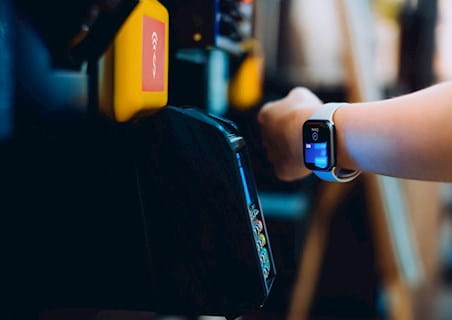Episode 3: How companies can rewrite the rules of risk-taking
Arlan Hamilton, founder at Backstage Capital and Runner and author of It’s About Damn Time, talks about showing up authentically and not underestimating opportunities.
Q&A
Tell us about your background and your path to founding Backstage Capital?
About a decade ago, I was in Texas where I grew up and didn't have any connection to Silicon Valley. All I knew about startups was that Twitter and my iPhone came from startups. But around that time I wanted to launch my own company, and I wanted to learn how to raise capital. I learned that less than 10% of all venture capital goes to anyone who is not a white male in the U.S., where they make up a third of the entrepreneurs or even less in some cases. They were getting 90% of funding. So many of my friends who were white men didn't think that was fair or just either, and so we all worked together to build a fund that would invest in others.
In your book, It’s About Damn Time, you talk about the difference between being underrepresented and underestimated. Can you talk about how that has played out for you?
Both are accurate descriptions of a gay woman who is Black, like myself, but underrepresented is just sort of what you are as compared to others in the room. I think underestimated is what you are to yourself and how the view is from someone else's point of view, which means unfortunately sometimes women, people of color, are viewed as not as good as the next person–not as capable, not as smart, not as viable for investment. But if you look at it from the lens of, “you're missing out, you have not seen our full potential, you're underestimating what we might become or who we are today” that turns things into more of a competition and it makes things more interesting in my view. And I've had a lot of investors’ ears perk up when you use that term rather than underrepresented.
Backstage has invested in more than 200 companies and offers advice to countless other founders and entrepreneurs. How do you assess digital capabilities in some of the businesses that you're looking at?
We're fortunate enough at my fund, Backstage Capital, to have more than 500 mentors and experts. Some of them are investors in the fund and some of them are community members. That allows me personally to have the best seat in the house and look for innovation. I think about it from a consumer’s point of view. We help them understand how they can use their digital presence for whatever they're working on. So it's more additive than necessarily looking to judge it.
Do you see digital helping to address some issues of equity and access that we're seeing?
Absolutely. I mean you think about COVID. It certainly showed us the disparities even more so between different groups of people and what they had access to. But then I think the lack of ability to be in the same room with people and to move about the country started to level the playing ground a little bit. A lot of founders found their footing and figured out what they were made of. You could no longer have just the camaraderie that some investors have with founders that tells them, “this is a good investment because we can have a beer together.” You had to have substance behind it and compare apples to apples. And I think that's why a lot of founders from underrepresented and underestimated backgrounds were able to shine, and in some cases bypass investors altogether and reach their customer faster and better and stronger.
You’re very good at getting attention for the platform. How did you create buzz?
As corny as it might sound, it has to do with authenticity.
I think the key is making sure that you're not just giving everyone the highlight reel, because they don't have much to root for in that case. So if the app was late, talk to the audience about why it was late. I guarantee you people are going to relate to that.
”
You may think you're alienating them or you may think I can't be that vulnerable. No, that's when you endear them, that's when you have them as part of your family and they want to see you win.
I'd love to turn to your latest venture. How is Runner using digital to create a more even playing field for startup companies and workers alike?
After seeing 10,000 companies pitch me over the past seven years or so, the number one thing people ask founders and others ask is: can you help us raise more money? But then the second question is, can you help us hire great people? And so what Runner does is we find and match talented and trustworthy operations talent to companies of all sizes. We do a very extensive interview process across multiple people within our team, and then we're having that same energy for the customers themselves. So we're interviewing the customers to see who's a great fit. The vision is to be able to push a button and have an amazing vetted and rated executive assistant or head of operations start the following Monday.
What does digital mean to you?
Digital is access to everyone at any time. Digital is, it's a state of being, and it's being able to reach your target customer, being able to reach people–perhaps even your soulmate. I think about it as something that helps you reach people and connect.
Show Notes
Being a digital company means being comfortable with taking risks. No one knows how to do that better than Arlan Hamilton, who went from being homeless to becoming a top VC investor. Host Rissa Reddan talks to Arlan about how companies can rewrite the rules of risk-taking and how to avoid underestimating big opportunities.
4:20 – About Arlan Hamilton
5:50 – How do you choose an entrepreneur for investment?
6:43 – The difference between being underrepresented and underestimated
7:58 – How do you assess digital capabilities in companies you’re considering for investment?
9:10 – Does digital presence help address disparities among different groups
10:31 – Arlan’s incredible success with crowdfunding
11:40 – How she created buzz to attract investment on crowdfunding platform
13:45 – About Arlan’s book, It’s About Damn Time
14:23 – Arlan’s experience in the music industry
15:05 – About Arlan’s latest digital venture, Runner
17:00 – How does Runner manage people?
18:10 – How digital has been a catalyst in Arlan’s life
Related Content
This is Digital
West Monroe's team of experts and guests pull back the curtain on how to build digital throughout an organization. Through real-world examples, you will learn how to spot digital transformation in real life, and how to make small decisions every day that make a big impact on growth.













































